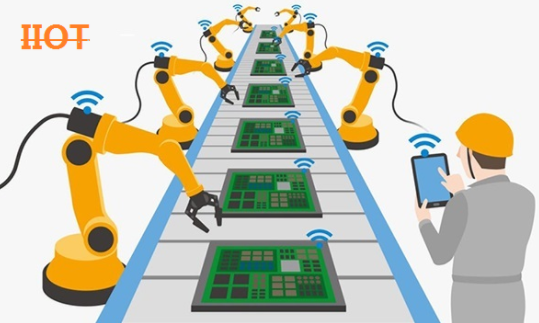The formulation and implementation of a series of national strategies such as "German Industry 4.0", "Made in China 2025" and "American Industrial Internet" show that all countries are determined to break through the boat and hope to build their own world in the industrial field. According to the data, the global IoT equipment base in 2017 is 20 billion units, and it is expected to reach 75.4 billion units by 2025, with a compound growth rate of 17%. With the continuous development of the Internet of Things market, it is expected that the overall size of the Internet of Things in China will exceed 1.8 trillion yuan by 2020.
The Internet of Things is developing rapidly, and the industrial Internet, which is the core of the Internet of Things, will usher in new development opportunities. The introduction and implementation of a series of national strategies such as “German Industry 4.0”, “Made in China 2025” and “US Industrial Internet” illustrate Every country is determined to break through the hustle and bustle, and hopes to build its own world in the industrial field.
Industrial Internet of Things will promote economic development
As a product of a new type of manufacturing technology, the Industrial Internet has been called a new entry point in the Internet of Things era by many insiders. Some experts have said that as long as the 1% efficiency improvement can be achieved, it will produce an incalculable economic value, and 1% has the magic to incite a huge economy.
In the global rail freight industry, if efficiency increases by 1%, it means saving $27 billion in fuel.
In the global healthcare industry, a 1% increase in medical efficiency means more than $63 billion in medical costs.
The efficiency of all natural gas thermal power plants in the world is increased by 1%, which means saving $66 billion worth of fuel.
General Electric CEO Ismail said the goal of the Industrial Internet is to upgrade those key industrial sectors. The industrial Internet will bring about tremendous changes in the development of the Internet of Things. It can be seen that transforming traditional industries with industrial Internet of Things will bring profound changes to the production, operation and management mode of enterprises, improve production and manufacturing efficiency, save energy, promote the transformation of economic development mode from production drive to innovation drive, and promote industrial structure. Adjustment.

Industrial IoT market has broad prospects
In recent years, various families have continuously carried out technological innovations to further promote the intelligentization of industrial systems. The development of smart manufacturing requires industrial IoT technology to transform manufacturing into digital manufacturing transformation. This transformation has a huge market. According to the GSMA think tank, the number of industrial Internet of Things (IIoT) connections will reach 13.8 billion by 2025, of which the number of connections in Greater China is about 4.1 billion, accounting for about one-third of the global market. At the same time, according to data from the Ministry of Industry and Information Technology of China, the annual growth rate of China's industrial IoT market revenue is about 25%, and will reach nearly 300 billion yuan (US$47 billion) in 2018. This shows that the Internet of Things and the Industrial Internet of Things are ushered in a period of rapid development.
Alex Sinclair, chief technology officer of GSMA, said that the Internet of Everything is changing the way we live and work. China has invested heavily in industrial IoT, monitoring and simplifying industrial production processes, greatly improving production efficiency and reducing production costs. With the support of the government. China will become a global leader in this field.
Industrial production monitoring, optimizing supply chain management system
The development of industrial Internet of Things will promote the development of industrial Internet. At present, the application of industrial Internet of Things is mainly in the optimization of industrial production process management system, which is mainly divided into the following five points:
1. Raw material procurement, inventory, and sales: The raw material supply chain management system can apply sensor network technology to improve supply chain efficiency and reduce costs.
2, process optimization of the production process: the use of IoT related technology to achieve production line process detection, real-time parameter acquisition, production equipment monitoring, material consumption monitoring, thereby improving product quality and optimizing production processes.
3, product equipment monitoring: the integration of sensing technology and manufacturing technology, to achieve the record of the use of product equipment, and remote diagnosis of faulty equipment.
4. Environmental monitoring: Various pollution sources will be generated in the industrial production process. Wireless sensing equipment will be installed in the sewage outlet of the enterprise to monitor the sewage discharge in real time, and the sewage outlet can be closed remotely to prevent sudden environmental pollution accidents.
5. Industrial safety production management: The IoT sensor is embedded in the mining equipment, oil and gas pipelines, and miners equipment. When the staff enters the corresponding location, they can monitor the safety status of the staff in real time, and real-time perception. If there is a sudden accident, the first one can be Time to save.
Strengthening the system of safety construction, improving safety
The safety of each new technology is of concern. Industrial Internet security is still a relatively new security field. It is highly complex and cutting-edge. It is difficult for a single enterprise to provide full-link, full-process, all-weather industrial Internet security capabilities. Open, shared, and cooperative, it has become a new network security space. Consensus under the situation.
At present, China is already the world's largest industrial automation market, with many advantages such as large number of people, big data, and increasing the number of enterprises. However, most of the core technologies of the industrial Internet of Things are still in the hands of foreign countries, how to accumulate and use advanced foreign technology. We are the following questions and challenges.


